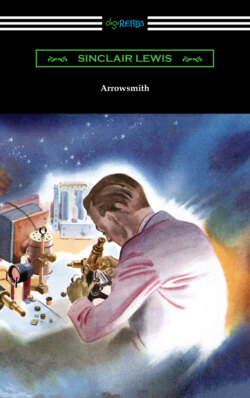Читать книгу Arrowsmith - Sinclair Lewis - Страница 26
На сайте Литреса книга снята с продажи.
ОглавлениеII
Madeline was at once sympathetic and sensible. Why not complete his medical course, then see what he wanted to do?
They tramped, they skated, they skied, they went to the University Dramatic Society play. Madeline’s widowed mother had come to live with her, and they had taken a top-floor flat in one of the tiny apartment-houses which were beginning to replace the expansive old wooden houses of Mohalis. The flat was full of literature and decoration: a bronze Buddha from Chicago, a rubbing of Shakespeare’s epitaph, a set of Anatole France in translation, a photograph of Cologne cathedral, a wicker tea-table with a samovar whose operation no one in the University understood, and a souvenir post-card album. Madeline’s mother was a Main Street dowager duchess. She was stately and white-haired but she attended the Methodist Church. In Mohalis she was flustered by the chatter of the students; she longed for her home-town, for the church sociables and the meetings of the women’s club—they were studying Education this year and she hated to lose all the information about university ways.
With a home and a chaperone, Madeline began to “entertain”: eight-o’clock parties with coffee, chocolate cake, chicken salad, and word-games. She invited Martin, but he was jealous of his evenings, beautiful evenings of research. The first affair to which she enticed him was her big New Year’s Party in January. They “did advertisements”—guessed at tableaux representing advertising pictures; they danced to the phonograph; and they had not merely a lap-supper but little tables excessively covered with doilies.
Martin was unaccustomed to such elegance. Though he had come in sulky unwillingness, he was impressed by the supper, by the frocks of the young women; he realized that his dancing was rusty, and he envied the senior who could do the new waltz called the “Boston.” There was no strength, no grace, no knowledge, that Martin Arrowsmith did not covet, when consciousness of it had pierced through the layers of his absorption. If he was but little greedy for possessions, he was hungry for every skill.
His reluctant wonder at the others was drowned in his admiration for Madeline. He had known her as a jacketed outdoor girl, but this was an exquisite indoor Madeline, slender in yellow silk. She seemed to him a miracle of tact and ease as she bullied her guests into an appearance of merriment. She had need of tact, for Dr. Norman Brumfit was there, and it was one of Dr. Brumfit’s evenings to be original and naughty. He pretended to kiss Madeline’s mother, which vastly discomforted the poor lady; he sang a strongly improper negro song containing the word hell; he maintained to a group of women graduate students that George Sand’s affairs might perhaps be partially justified by their influence on men of talent; and when they looked shocked, he pranced a little, and his eyeglasses glittered.
Madeline took charge of him. She trilled, “Dr. Brumfit, you’re terribly learned and so on and so forth, and sometimes in English classes I’m simply scared to death of you, but other times you’re nothing but a bad small boy, and I won’t have you teasing the girls. You can help me bring in the sherbet, that’s what you can do.”
Martin adored her. He hated Brumfit for the privilege of disappearing with her into the closet-like kitchen of the flat. Madeline! She was the one person who understood him! Here, where everyone snatched at her and Dr. Brumfit beamed on her with almost matrimonial fondness, she was precious, she was something he must have.
On pretense of helping her set the tables, he had a moment with her, and whimpered, “Lord, you’re so lovely!”
“I’m glad you think I’m a wee bit nice.” She, the rose and the adored of all the world, gave him her favor.
“Can I come call on you tomorrow evening?’
“Well, I—Perhaps.”
